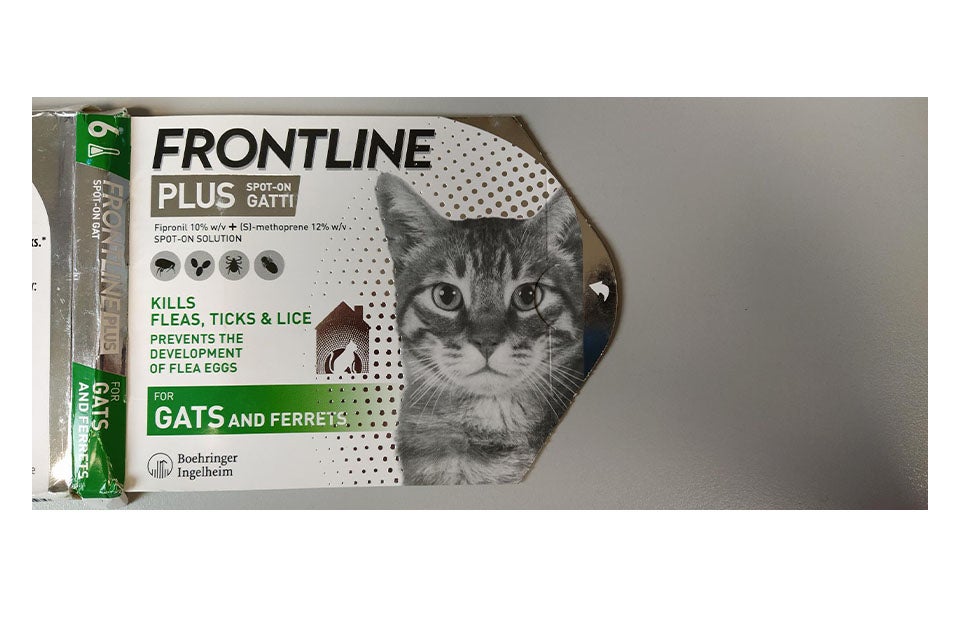
Pet owners have been warned against buying potentially dangerous fake treatments online after one cat was severely poisoned and required emergency surgery.
A fake flea treatment almost killed Persian tabby cat Smokey, after owner Alan Wall applied a treatment he bought online.
The 45-year-old from Preston believed he bought the same brand he had used for years, Frontline Plus. But within hours of applying the treatment, his usually lively cat became violently ill, started to vomit and refuse water.
The vet discovered Smokey had a blockage in his intestines and required emergency surgery. Further tests confirmed he had suffered a toxic reaction.
Mr Wall showed the vet the product he used and although at first glance the medication looked genuine, the manufacturers said it was counterfeit.

Lab tests revealed the product, which was riddled with spelling mistakes like “Gatti”, which Mr Wall assumed was an Italian version of the product, contained a chemical which is highly toxic to cats.
"We felt really guilty about the fact we had done this to him," Mr Wall told the BBC's Morning Live. "But finding out it was fake medication, we were really angry. It's horrific and I had absolutely no idea there was such a thing as fake pet medication."
It comes after the government issued a warning about fake veterinary products being sold online.
The government’s Intellectual Property Office (IPO) and Veterinary Medicine Directorate (VMD) are urging pet owners to take caution when purchasing common medicines, including common flea treatments and wormers.
Officials are urging pet owners to recognise signs of counterfeit products, avoid using suspicious items, and know how to report concerns.
Counterfeit animal medicines deliberately copy the appearance, packaging and branding of genuine veterinary products to deceive pet owners. Like all counterfeits, they are illegal to sell in the UK.
These fakes typically lack proper active ingredients, making them ineffective. Worse still, they may also contain harmful substances, causing severe reactions including vomiting, muscle tremors, breathing difficulties, seizures and potentially death.
Dr Heilin-Anne Leonard-Pugh, a VMD veterinary surgeon and efficacy assessor, said: “Exposure to [the pirimiphos-methyl insecticide] can prevent the cat’s body from breaking down a substance called acetylcholine, leading to an overstimulation of the cat’s nervous system.
“This can cause symptoms such as vomiting, uncoordinated gait, muscle tremors, weakness, paralysis, increased sensitivity to touch, difficulty breathing, restlessness, urinary incontinence, low heart rate and seizures. In some cases, even death can sadly occur.”
Dr Leonard-Pugh urged pet owners to seek immediate veterinary advice if their pet is exposed to a counterfeit medicine.
There are a few warning signs to look out for when buying animal medicines online, including poor quality packaging with spelling and grammatical errors.
In some cases, the product may be missing a leaflet or expiry dates, it may have a suspicious smell or contain poor-quality tablets, and have a home-made appearance.
Other tell-tale signs include heavily discounted goods, flash sales and an offer that is too good to be true.
Renters reform bill could result in one million new pet owners
Pharmacy leaders issue warning over ‘dangerous’ medicine delays
Warning after cancer patients died following delays in getting life-saving drugs
Thousands at risk of invalidating travel insurance by using weight-loss jabs
Childhood loneliness increases risk of dementia, study finds
China’s ‘ghost particle’ machine could solve science’s greatest mysteries







